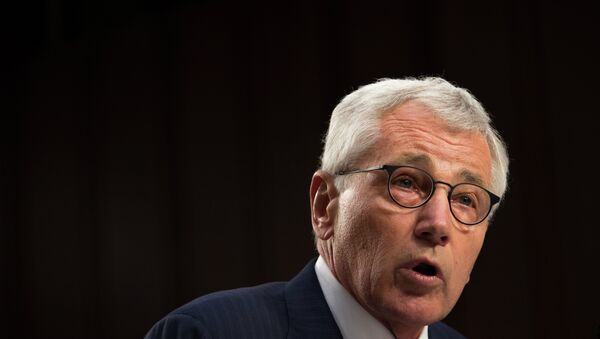MOSCOW, October 30 (RIA Novosti), Ekaterina Blinova — The US should get ready for a new era of endless wars, stated Pentagon's chief Chuck Hagel, noting that "tyranny," "terrorism," national security challenges and climate change pose a substantial threat to the US and its allies.
"I think we are living through one of these historic, defining times. We are seeing a new world order—post-World War II, post-Soviet Union implosion—being built. There are many questions, foremost among the American people: What's the role of America in this new world that is evolving? Should we have a role? What is appropriate?" said Chuck Hagel, as cited by the Atlantic.
The US Secretary of Defense claims that as the global leader, the US will "continue to grapple with overseas threat for the foreseeable future," containing international terrorism and tyrannical regimes. "Hagel didn't seem especially sanguine that it would end anytime soon. In other words: Get used to endless war," stressed the Atlantic, characterizing the Pentagon's new doctrine.
Remarkably, practically none of the previous US overseas military campaigns has proved effective. "US soldiers have been laboring under sad paradox: even though the United States enjoys unprecedented global military dominance that should cow enemies mightily, it has found itself in constant combat for longer than ever before in its history, and without much to show for it," writes Richard K. Betts, the Arnold Saltzman Professor of War and Peace Studies in the Department of Political Science, in his article "Ending America's Era of Permanent War" published in Foreign Affairs. The professor points out that of the US military actions in Kosovo, Afghanistan, Iraq, and Libya, "only the first can be counted a success."
Surprisingly, despite the apparent failure of the US military campaigns in Iraq and Afghanistan and "strong fiscal constraints," Washington is still expanding its war plans. According to the expert, the White House should not cut back its overseas military operations, but prepare for "more action."
"Frightening challenges in three critical regions are demanding yet more action: Islamic extremists have seized large swaths of territory in Iraq and Syria, Russia has intervened in Ukraine, and China is flexing its muscles in East Asia," stressed Richard K. Betts.
The idea of the US "moral obligation" to meddle into domestic affairs of other countries in order "to set them right" is a "mythological concept," aimed at justification of American interventionism, contended Justin Raimondo, the editorial director of Antiwar.com and a senior fellow at the Randolph Bourne Institute.
"The idea that the United States must exercise "global leadership" is rationalized by our interventionists as a necessary prerequisite for maintaining some type of "world order," Mr. Raimondo underscores in his article "Putin’s Complaint: Is Washington a Revisionist Power?"
However, the Pentagon's "endless war," cannot last forever, as it is the American taxpayers who pay for the extortionately expensive military operations. For instance, the Afghanistan campaign cost the US "roughly $45 billion a year from 2001 to 2013," while Iraq cost "about $100 billion a year from 2003 to 2011," Kenneth M. Pollack, a Senior Fellow at the Brooking Institution and former CIA analyst, noted in his article "An Army to Defeat Assad." It is worth mentioning that more than half of American respondents said that the US had not achieved its goals in both Iraq and Afghanistan, expressing their discontent with US foreign policy, according to the Pew Research poll conducted in the beginning of the 2014. Although 57 percent of US citizens approved the US campaign against Islamic State according to the October poll, 55 percent strongly oppose sending US ground troops to Iraq and Syria.
It should be also noted that the December poll in 2013 carried out by the Pew Research indicated that 52 percent thought the United States "should mind its own business internationally and let other countries get along the best they can on their own." The researchers underscore that the tendency demonstrated by the poll reflects a gradual and longstanding decline. According to the October 2014 poll, most Americans consider inequality more dangerous than nuclear weapons, or sectarian religious threats.
Although the Pentagon's chief urges to prepare for an endless war, the question remains open if ordinary Americans will support the new doctrine.

